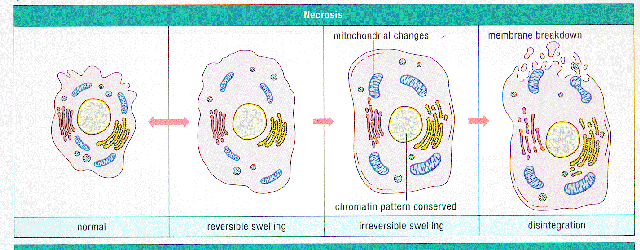At the level of the cell (like the cells withing your body), there are really “two ways to go”.
Necrosis

- the cell swells
- the basic internal components of the cell (e.g. the DNA in the nucleus) stay pretty much the same
- the cell disintergrates, leaving a mess behind
- tends to result from some some external force (e.g. an injury or infection)
Apoptosis

- the cell shrinks
- the internal components break down in an orderly way (e.g. DNA fragmentation)
- the cell fragments and makes a ‘clean’ exit
- tends to result from an internal ‘cell death programme’, i.e. the organism in doing this on purpose
Cell death programmes, far from being sinister, are essential to proper growth and development. In order to make the spaces between your fingers, for example, certain cells had to die and be removed during your development.
Apoptosis is particularly interesting to humans because problems with cell death not going on as planned are implicated in diseases like Alzheimer’s, and because the ability to target and kill cells selectively would be of great benefit in the treatement of diseases like cancers.
But before we get too excited about this, does apoptosis occur in single celled organisms?
- it has been documented in bacteria (Yarmolinsky 1995)
- it has been documented in protozoans (Welburn et al. 1997)
- I have published some evidence for it in phytoplankton (Berges and Falkowski 1998)
But why would a unicellular organism kill itself?
- in a time of starvation, it would liberate nutrients for neighbouring (genetically identical) cells (altruism; Yarmolinsky 1995)
- it is a response to disease, i.e. a way to prevent a viral infection from spreading to other cells (sacrifice in the face of foes; Mittler and Lam 1996)
- it reflect a degree of ‘social organisation’ among unicellular populations (Raff 1992)
- there is no reason: it is just an obscure pathway that developed in unicellular organisms and simply persisted until multicellular organisms arose, when it became useful
The Bottom Line: We don’t know.